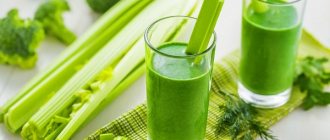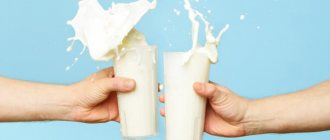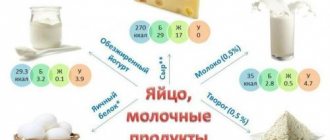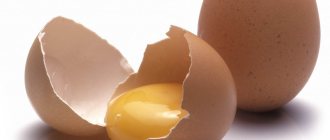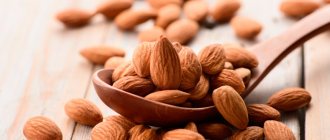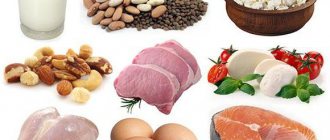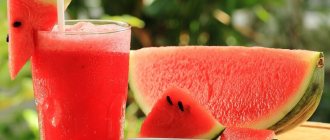Protein can change levels of weight-regulating hormones
Your weight is actively regulated by the brain, specifically by one area of the brain, the hypothalamus.
To figure out when and how much you should eat, your brain processes a variety of information.
The most important signals to the brain are hormones, which change in response to food intake.
Increased protein intake increases levels of the satiety hormone GLP-1 (an appetite suppressant), as well as peptide YY and cholecystokinin, while decreasing levels of the hunger hormone ghrelin.
By replacing carbohydrates and fats with protein, the level of hunger hormones decreases, and the levels of satiety hormones increase.
This process significantly reduces hunger and is the main reason why protein is so good for weight loss. Thanks to him, you automatically consume fewer calories.
Bottom line: Protein reduces levels of the hunger hormone, ghrelin, while increasing levels of the satiety hormone GLP-1 (an appetite suppressant), as well as peptide YY and cholecystokinin. This leads to an automatic reduction in the number of calories consumed.
When is the best time to eat protein?
In general, you can eat lean protein at any time. But for those losing weight, it is advisable to eat carbohydrates in the first half of the day, and under no circumstances should you give them up.
From this we conclude: porridge with milk is good in the morning, and a combination of protein products and vegetables in the afternoon and evening. Snacks can be both protein and carbohydrate, but try not to eat carbohydrates 2 hours before a protein meal.
I note that the best time for a protein meal is in the evening. Such a dinner will absolutely prevent you from gaining weight. At night, energy will be consumed, which you almost did not provide to the body in the evening (after all, you ate few carbohydrates or did not eat them at all).
Well, he will have to take energy from your fat reserves. And you don’t mind – do you?
But avoid hard-to-digest protein foods (for example, meat) for dinner - this will interfere with proper sleep. And such sleep is important for both weight loss and your well-being.
Digesting and absorbing protein burns calories
At the end of a meal, a certain amount of calories is used to digest and assimilate the food.
This process is often called the thermic effect of food.
Although not all sources provide the same numbers, it is clear that the thermic effect of protein is much higher (20-30%) compared to carbohydrates (5-10%) and fats (0-3%).
If the thermic effect of protein is 30%, this means that from 100 calories of protein, there are only 70 calories that can be used by the body.
Bottom Line: Approximately 20-30% of protein calories are burned when the body digests and absorbs protein.
Interesting facts about protein
Protein is needed for weight loss not only because cells are built from it, it is not stored in fat reserves, and at the same time it is quite filling.
Thanks to protein we:
- more energetic;
- we resist diseases better (immune cells die when fighting infections, and protein is needed to build new ones);
- we absorb vitamins (proteins are a kind of transport for them);
- and we are even in a better mood!
Even though the above is not directly related to losing weight, it is impossible to live without these important processes in the body, let alone losing weight!
In a word, protein is important for losing weight, and absolutely indispensable for a happy existence. To keep your muscles strong, your skin to glow, diseases to be avoided, and at the same time to be full, and even lose weight - eat protein! I wish you beauty, slimness and health!
Protein helps you burn more calories (increases calorie expenditure)
Due to its high thermic effect, as well as several other factors, increased protein intake speeds up metabolism, which leads to more active calorie burning around the clock, even during sleep.
According to research, increased protein intake speeds up metabolism and also helps you burn 80-100 more calories per day.
This effect is especially pronounced during overeating and excess calorie consumption. According to one study, overeating on a high-protein diet increases the number of calories burned per day by 260.
By increasing the number of calories burned, high-protein diets have a "metabolic advantage" over low-protein diets.
Bottom line: increased protein intake leads to an 80-100 increase in calories burned per day; A study showed that overeating burns 260 more calories per day.
Protein reduces appetite and helps you consume fewer calories
Protein can reduce appetite and hunger through several mechanisms.
This results in an automatic reduction in calorie intake.
In other words, you start consuming fewer calories without having to count calories or control portion sizes.
Numerous studies have shown that by increasing protein intake, people begin to consume fewer calories.
As long as you eat plenty of protein, this principle works at every meal, as well as by continually reducing your caloric intake on a daily basis.
According to one study, when protein calories make up 30% of the total, people automatically eat 441 fewer calories, which is a fairly large number.
Therefore, high-protein diets not only have a metabolic advantage - they also have an "appetite advantage", making it easier to cut calories compared to low-protein diets.
Bottom line: High protein diets are extremely nutritious and therefore reduce hunger and appetite, unlike low protein diets. Eating a high-protein diet makes it much easier to limit your calorie intake.
Protein helps avoid compulsive food cravings and reduce the desire for late-night snacking
Irresistible food cravings are the main enemy of any person trying to lose weight.
This is what most often leads to diet failures.
Another big problem is late-night snacking. Many overweight people complain of sudden desires to eat at night, and therefore prefer to have a snack in the evening. The calories received after such a snack are added to the number accumulated for the whole day.
Interestingly, protein has a strong effect on both compulsive food cravings and late-night snacking.
The chart below is from a study comparing a high-protein diet with a normal-protein diet in overweight people:
The high protein group is represented by a blue bar, and the normal protein group is represented by a red bar.
In this study, the amount of protein was 25% of daily calories. As a result, food cravings decreased by 60%, and the desire to snack at night was halved!
Of all meals, breakfast should be especially rich in protein. One study found that eating a high-protein breakfast reduced food cravings among teenage girls.
Bottom line: Increasing your protein intake leads to a significant reduction in food cravings and desire to snack in the middle of the night. Such changes make it easier to switch to a healthy diet.
Which protein is best for weight loss?
There are several types of protein powder on the market. Each is a great help when losing weight or achieving other goals. There are some differences between different types of protein powder, so we'll list the most common and popular ones .
Whey Protein
Whey protein is one of the most popular protein sources , which contains all the essential amino acids and is therefore a complete source of protein. It is a protein mixture made from whey , which is a by-product of cheese production. Whey protein is high quality, highly digestible and contains minimal amounts of lactose. It is sold in the form of a concentrate containing 39-89% protein and an isolate or hydrolyzate containing 90-95% protein. [8] [9] [10]
A 2021 meta-analysis includes 9 studies on the effects of whey protein on weight loss in overweight and obese people. In the groups where participants consumed whey protein, results indicated significant reductions in weight and body fat percentage . In addition, improvements were found in the cardiovascular system blood pressure , cholesterol levels and blood sugar levels improved [18] [19]
The effect of whey protein on improving satiety was reflected in a study in which participants were divided into groups based on the type and amount of protein they consumed. The purpose of the study was to compare the effects on the body of a breakfast containing whey, soy or casein protein with 10% or 25% protein in the dish . At 10% protein, whey protein reduces hunger better than other sources. In the group that ate a 25% protein breakfast, there was no difference in satiety, but whey protein produced the strongest hormone and insulin . Based on the results, it can be seen that differences in satiety levels from consuming different types of protein powder occur when certain amino acid values exceed certain thresholds. This means that if you cook cereal for breakfast and add protein to it, the 10% whey protein content in the dish will help you feel as full as possible . If the protein content is 25%, the protein source does not matter since the amino acid content will be higher. [18] [20]
A further meta-analysis of several studies confirmed the effect of using protein in combination with strength training. Muscle growth in the upper and lower body was seen in participants who did strength training and took whey protein . [8] Whey protein is the most popular source of protein because it is readily available, contains all the essential amino acids, and is highly soluble. Want to learn more about the benefits of whey protein? Read our article - Which protein is better to choose? Whey concentrate, isolate or hydrolysate?

Casein
In addition to whey protein, milk also produces casein, which makes up 80% of the total protein content of milk. Although whey protein is water soluble, casein is the insoluble part of milk proteins. Casein is a complete protein source that differs from whey protein in its absorption time . Its longer absorption time causes a longer feeling of fullness , which plays an important role in losing weight. [8] [11]
Egg protein
Egg protein is made from egg whites that are separated and then dehydrated. One 30g dose contains approximately 105 calories and 23 grams of protein. Egg protein is an ideal alternative for those with milk intolerance or on the paleo diet . It is a source of vitamins and minerals found in eggs and is also low in fat and carbohydrates. [8] [12]
Soy protein
Soy protein is a plant source of all essential amino acids and is therefore classified as a complete protein . This is a product that is suitable for vegetarians, vegans and people looking for an alternative to animal proteins. [8]

Rice protein
Rice protein is a plant source of protein that is considered incomplete because it contains only small amounts of lysine. In 2013, a study was conducted to compare the effect of rice and whey protein on weight loss . Participants were divided into two groups and asked to consume 48 grams of protein during their training days . [8] [13] [14]
Participants trained 3 times a week for 8 weeks and consumed protein immediately after training . At the end of the study period, both groups showed significant changes in body fat, muscle mass, and strength. The results confirmed that rice protein was as effective in weight loss as whey protein. [8] [13] [14]
How much protein should you take when losing weight?
The recommended daily protein intake depends on your goal, whether it's muscle growth or weight loss . Another important parameter is your weight . In the table you will find the daily protein intake per 1 kg of weight and conversion to average weight. [7]
| Squirrels | |
| In the absence of physical activity | 1.2 g/kg |
| If you are overweight | 1.2 – 1.5 g/kg |
| When playing sports, for the purpose of maintaining weight, performance and regeneration | 1.4 – 1.6 g/kg |
| When playing sports to build muscle mass | 1.4 – 2.4 g/kg |
| When playing sports to lose weight | 1.8 – 2.7 g/kg |
| Daily protein intake for men weighing 80 kg | Daily protein intake for women weighing 60 kg | |
| In the absence of physical activity | 96 g | 72 g |
| When playing sports, for the purpose of maintaining weight, performance and regeneration | 112 – 128 g | 84 – 96 g |
| When playing sports to build muscle mass | 112 – 192 g | 84 – 144 g |
| When playing sports to lose weight | 144 – 216 g | 108 – 162 g |

Protein helps you lose weight without consciously restricting calories
Protein is on both sides of the calorie difference theory, i.e. reduces calorie intake and increases calorie expenditure.
Therefore, it is not at all surprising that high-protein diets lead to weight loss, and it is not at all necessary to limit yourself in calories, fats and carbohydrates or reduce portions.
In a study of 19 overweight people, increasing protein intake by 30% of calories caused a significant decrease in calorie intake.
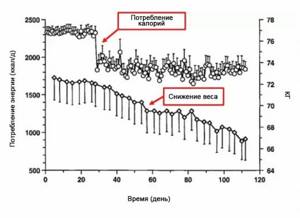
Participants in this study lost an average of almost five kilograms in four months. Don’t forget, they just added protein to their diet, and did not limit themselves to one product or another.
And although the results are not always so impressive, most studies do show that high-protein diets lead to significant weight loss.
Increased protein intake is also associated with a decrease in belly fat, which accumulates around organs and causes various diseases.
However, weight loss is not the most important factor. Long-term maintenance of the body in good shape is what is truly valued.
Many people go on a diet and lose excess weight, but for most, the lost pounds subsequently return.
Interestingly, increased protein intake prevents rapid weight gain after weight loss. In one study, a small increase in protein intake (15 to 18% of calories) reduced weight gain after weight loss by 50%.
So, protein can not only help you lose excess weight - it also helps you stay in shape.
Bottom line: Eating a high-protein diet can help you lose weight without counting calories, portion control, or cutting carbs. Moderately increasing your protein intake can also help prevent weight gain after successful weight loss.
The perfect combination
You can decide which proteins to eat when losing weight and which to combine with if you know a few rules:
- Canned foods should not be mixed; they should be divided and not eaten at once.
- Never baste meat with vinegar, sauce, or other acidic condiments. Everyone loves to eat kebab with pickled onions or ketchup, and then they are surprised by the heaviness in the stomach and discomfort. This is due to the fact that the intestines already contain all the necessary acids for digestion, and additional acid will only block the processes. Hence heartburn, increased acidity and the danger of gastritis and ulcers.
- Proteins require careful digestion, and fats significantly slow down this process. Therefore, you should not eat fats and proteins at the same time.
- It is better to add more vegetables and herbs to proteins such as meat. This will not only improve digestion, but also help speed up the process of fat breakdown.
- Never eat proteins with sugar. If you love cottage cheese very much, you should give up any sweeteners.
- Eating sugar with starch will cause fermentation in the body, so these products cannot be combined.
- There is a myth that melon is hard on the stomach. It is a myth. The intestines cope well with it if you eat melon in its pure form. It is not recommended to eat any food one hour before taking this product and two hours after it. Milk is also a single product.
- Any desserts should not be consumed after the main meal. Not earlier than in an hour.
- You should not eat proteins and carbohydrates at the same time.
More on the topic >> Is it possible to eat lard while losing weight, but with onions, garlic, lingonberries
Protein prevents muscle loss and slow metabolism
It is not always possible to put an equal sign between losing excess weight and getting rid of excess fat.
During weight loss, not only the numbers on the scale decrease, but muscle mass also decreases.
However, your real goal is to get rid of body fat, i.e. subcutaneous and visceral (located around internal organs) fat.
Losing muscle mass is a side effect of losing weight that most people try to avoid.
Another side effect is a slowdown in metabolism.
In other words, you start burning fewer calories than you did before losing weight.
This phenomenon is often called “starvation mode” - the number of calories burned per day decreases by several hundred.
By saturating your body with enough protein, you reduce the loss of muscle mass, as a result of which, while reducing body fat, your metabolic rate remains unchanged.
Strength training is another important factor that can reduce muscle loss and prevent metabolic slowdown when losing weight.
This is why targeted protein intake and intense strength training are two of the most important components of an effective weight loss program.
They not only maintain your metabolic rate, but also make sure that your body, temporarily hidden by a layer of fat, looks good. Without protein and strength training, you can achieve a low weight, but at the same time, fat mass will prevail over muscle mass, and your figure will not become slim and fit.
Bottom line: High protein intake helps avoid muscle loss during weight loss and also helps maintain a fast metabolism, especially during intense strength training.
How much protein should a person consume?
The recommended daily protein intake is just 46 grams for women and 56 grams for men.
This amount will help you avoid protein deficiency, but it won't be enough if you're trying to lose weight (or build muscle).
Most studies on the relationship between protein and weight loss offer a recommended amount of protein as a percentage of calories.
To find out how much protein you need to consume, multiply your daily calorie intake by 0.075. For example, if your daily requirement is 2000 calories per day, you need to consume 150 grams of protein (2000 * 0.075).
Additionally, the amount of protein can be calculated based on your weight. The general recommendation is 1.5-2.2 grams of protein per kilogram of muscle mass.
It is best to distribute your daily protein intake so that protein is present in every meal.
Don't forget that the numbers don't have to be exact; Anything within 25-35% of calories will be adequate.
Bottom line: To lose weight, you need to ensure that your protein intake is 25-35% of your total daily calories. 30% of calories is 150 grams of protein with a daily intake of 2000 calories.
How to fill your diet with protein
Increasing the amount of protein you consume is quite easy - just eat more protein-rich foods.
These products include:
- Meat: chicken, turkey, lean beef, pork, etc.
- Fish: salmon, salmon, sardine, haddock, trout, etc.
- Eggs: all types
- Dairy products: milk, cheese, yogurt, etc.
- Legumes: beans, chickpeas, lentils, etc.
If you are on a low-carb diet, choose meats with more fat. If you have a different diet, try to eat more lean meat - this will make it easier to consume high amounts of protein without increasing calories.
A variety of protein supplements are a good option if you are having trouble meeting your daily protein requirement. Herbalife Nutrition Formula 3 Protein Powder has been proven to have many benefits; for example, it helps to lose excess weight.
At first glance, consuming more protein may seem like an easy task. But in reality, adding it to your diet is not so easy.
I recommend using a calorie counter first. Weigh and measure all food to ensure you have enough protein in your diet.
Once you understand what a high protein diet looks like, you can stop doing it.
Bottom line: There are a wide variety of high-protein foods that can help increase your intake of this nutrient. It is recommended to use a calorie counter at the beginning to track the amount of protein you consume.
Where can I get so much protein?
I would like to immediately draw your attention to the fact that not all the protein contained in foods is absorbed by our body. Therefore, I have made a convenient table for you, in which you should be mainly interested in the last column - THE AMOUNT OF ABSOLUTE PROTEIN.
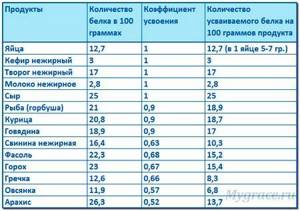
Example: 1 egg, 0.5 liters of kefir, 150 gr. cottage cheese, 50 gr. dry oatmeal, 100 grams of pink salmon - this is 68.8 grams of protein.
Do you eat that much in a day? Try to keep it under control.
For you, AT LEAST one or two meals a day should consist of low-fat protein foods, perhaps with the addition of fresh vegetables or a salad made from them. Plus 1-2 protein snacks.
Lean protein: eggs, low-fat dairy products, legumes, lean fish, poultry, meat, seafood. Don't make this protein fatty yourself - i.e. do not fry it or add oil to it. Let it be boiled, stewed, baked or steamed dishes.
An interesting pattern holds true for protein products: the less fat they contain, the more protein they contain, which helps you lose weight.
A small practical task.
Right now, sit down and write down at least 10 lean protein foods you know of. Here is an approximate beginning of this list: steamed cheesecakes, omelette, cottage cheese, baked fish...
The more dishes you find, the better - this way you won’t constantly have the question: “What protein will I eat today?”
Protein is the easiest and most delicious way to lose weight.
When it comes to losing weight and getting in shape, protein is second to none.
You don't have to restrict yourself in any way to benefit from increased protein intake—on the contrary, you're enriching your diet.
This method is especially good because most high-protein foods are very tasty, so increasing the amount of them in your diet is easy.
A high-protein diet is also an effective way to prevent obesity, not just a means of temporarily losing fat mass.
By consistently increasing your protein intake, you put the calorie gap theory to work in your favor.
Over the course of months, years, or decades, the difference in your waist size can be dramatic.
However, remember that the number of calories still matters. Protein can reduce hunger and increase your metabolic rate, but you won't be able to lose weight unless you burn more calories than you consume.
It's easy to overeat and overwhelm your caloric deficit caused by increased protein intake, especially if you overindulge in fast food.
That's why your diet should be based on single-ingredient whole foods.
Although this article is only about weight loss, protein has other health benefits.
Why are protein diets harmful?
Surely, after reading the above, many will be tempted to go on some kind of protein diet and lose weight quickly and satisfyingly. And this is a mistake that can be fatal for your health!
High-protein diets provoke a number of diseases - colitis, gout, stones in the bladder and kidneys, and even atherosclerosis. It is not for nothing that American doctors called the Atkins diet (in our country it is common as the Kremlin diet) a direct path to a heart attack.
By the way, about the figure – everything here is also quite complicated. During a protein diet, weight is lost mostly due to muscles, but the kilograms that return after the diet are already fat.
There are often cases when a person does not gain more weight than before following a protein diet, but looks much fuller than before. Fat weighs lighter than muscle! In addition, muscles actively burn fat, but fat itself does not burn anything.
Of course, the body spends a certain amount of energy to “maintain” the fat reserves and transport it in space (for example, it is harder for the legs to “carry” a large weight) - but these expenses are not comparable to the energy consumed by the muscles. Unprofitable substitution!
